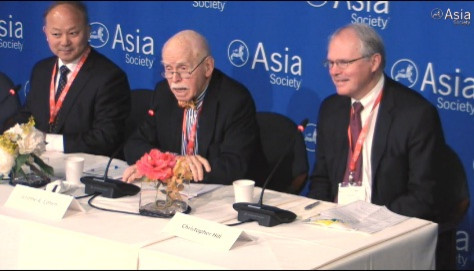What Will It Take For China And US To Cooperate? Ask A Chinese Army General

Many are concerned that U.S.-China relations could be strained as a result of China’s ongoing territorial dispute with various nations in Asia, including American allies Japan and the Philippines. Lately, China and Japan have come close to armed confrontation over the Senkaku/Diaoyu Islands.
As China ramps up its military spending and continues to develop its naval presence and air force, insight into understanding China’s position as the area’s largest military, population and economic superpower is coveted.
Last week in New York, such insight was available from a very well-placed source: a high-ranking Chinese military officer.
Major General Zhu Chenghu of China’s People’s Liberation Army attended a three-day conference this past weekend, held at New York-based think tank Asia Society, taking part in a discussion about "The U.S.-China relationship in the South China Sea." During Zhu’s presentation, the two-star general, who is dean of defense affairs for China's National Defense University, pinpointed three different areas at the root of bilateral strain.
General Zhu explained that there are three main issues -- miscalculations, actions and reactions -- all beginning with distrust. Distrust, Zhu said, is the “fundamental cause for instability” of Sino-U.S. relations. Though Zhu never actually addressed the back-and-forth cyberhacking accusations between the U.S. and China that have been dominating the media during the past month, he spoke of the “cyberspace security field” as one situation where a breakdown in the three areas can be seen clearly.
Reports by both Bloomberg News and New York Times cited research by American network security company Mandiant, which estimated that 20 to 40 percent of Fortune 500 companies in the U.S. have been hacked by Chinese entities. China’s government fired back, pointing the finger back at the U.S., citing its own statistics, which claimed the No. 1 source of cyberattacks in China was the United States. Whether or not hacking is government-endorsed cannot be said with certainty, but evidence of mutual hacking has been discovered.
Though Zhu thoughtfully discussed both sides of relations, with his counterpart, former ambassador to Iraq and China expert Christopher Hill, representing the American viewpoint, the conversation was not fully open.
Zhu, giving no specific reason, did not take questions from foreign media. His attendance at the meeting could be considered a rarity: It's not common to see a Chinese general appear at a public forum in the West, discussing militar matters.
The U.S.-China panel was just one of several discussions that took place over the course of the conference. Representatives from several nations claiming ownership over disputed areas attended the meetings, which functioned as a sort of smaller, East Asian version of the United Nations, offering the point of view of nations such as Vietnam and the Philippines.
Zhu’s talk, however, did not delve into territorial claims (perhaps a condition of his attendance), as much as it discussed the state of U.S.-China relations regarding the South China Sea.
With many people speaking candidly, the discussion allowed for a multitude of viewpoints from all those involved in the South China Sea to be expressed. There was one position that reached a consensus: Resolution is distant but possible with deliberate and timely action and cooperation.
The discussion can be viewed in its entirety here.
© Copyright IBTimes 2024. All rights reserved.












